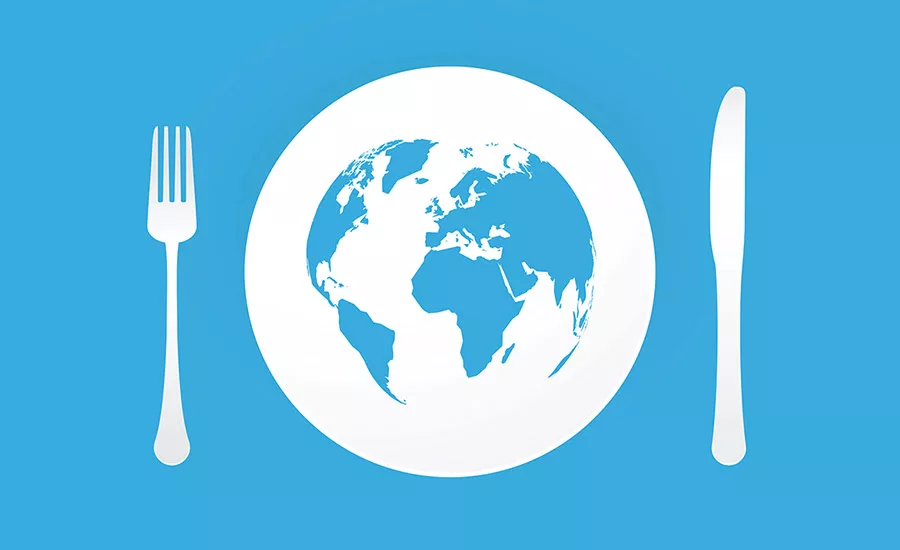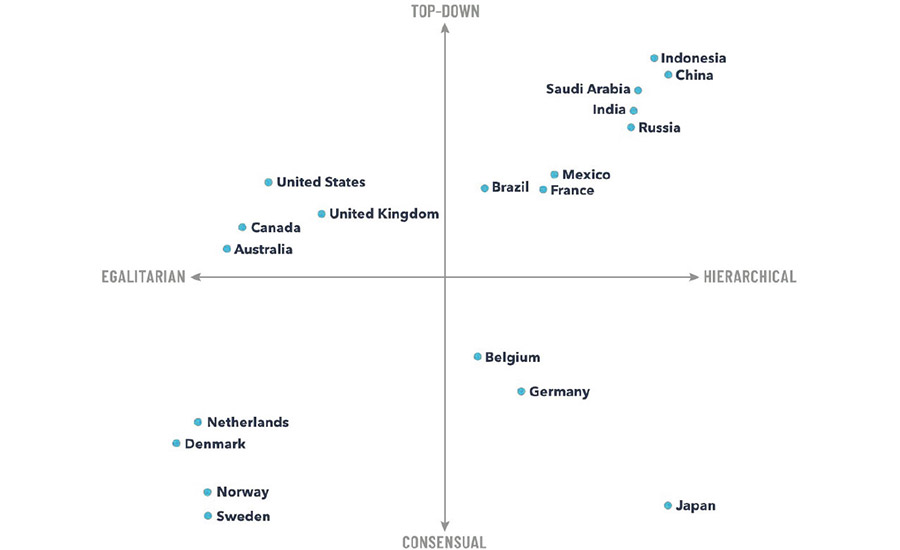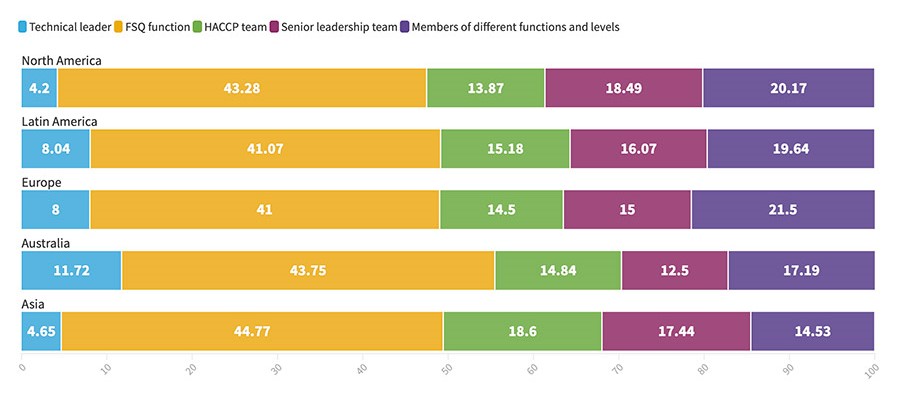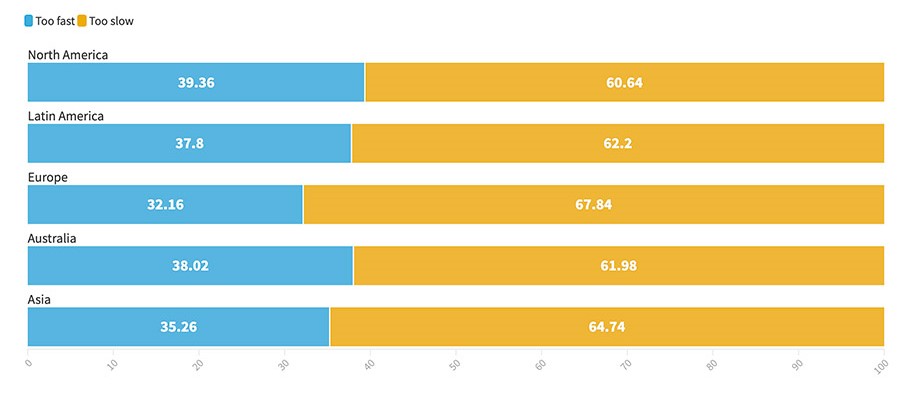Introduction to Global Food Safety Culture
Unique regional cultures have influence on food safety, as will be explored in this article series.

Throughout this year, the authors have had the pleasure of working with practitioners in five global regions: Europe, Australia, and New Zealand, Asia, North America, and Latin America. Together, we have explored the unique regional cultures in each of these geographic regions and their influence on food safety—specifically, food safety mindsets in food businesses.
This led to the Global Food Safety Culture webinar series, organized collaboratively by Food Safety Magazine, Cultivate SA, and 3M. While the authors do not wish to not to stereotype any geographic region, culture, or people, we aim to identify differences and features that prevail and render each global region unique. The goal is not to suggest right or wrong in these differences, but to foster understanding and enable better communication and management of food safety culture.
Different theories and social constructs have been proposed by scholars, such as Edgar Schein's three levels of organizational culture (Schein 2010), Shalom Schwartz's theory of basic values (Schwartz 2012; Witte et al. 2020), Geert Hofstede's six culture dimensions (Minkov and Hofstede 2011), and Erin Meyer's eight scales for mapping culture (Meyer 2014). Despite the diverse approaches, common traits are extracted for organizational culture, including it being "shared," "pervasive," "enduring," and "implicit," with "people interaction" (independence/interdependence) and "response to change" (stability/flexibility) being the most important considerations to characterize a culture (Groysberg et al. 2018). The authors chose the framework by Meyer, as it provides a clear view as to how leadership and business practices differ across regional cultures (Figure 1).
FIGURE 1. Leadership and Business Practices Described by Erin Meyer's Culture Map (Credit: Meyer 2017)

Mapping Leadership Cultures
Two questions regarding food safety decision-making were asked in every webinar: "By whom are most of your food safety decisions made?" and "Are most of your food safety decisions made too fast or too slowly?" Across all cultures, the food safety and quality (FSQ) function in general shouldered the most decision-making around food safety; around 60–70 percent of participants believed that their food safety decisions were made too slowly (Figures 2 and 3).
In European cultures, decision-making tends to be more consensual than top-down; authority style is likely egalitarian. During our live webinar poll on "Who makes most food safety decisions?" 41 percent (82 of 200 participants) answered "the FSQ function," and 22 percent (43 of 200 participants) answered "members of different functions and levels"—marking the highest percentage for cross-functional input. This outcome reflects the diversity in food safety decision-making in European cultures. Meanwhile, approximately 68 percent of the webinar participants (116 of 171 attendees) believed that their food safety decisions were made too slowly—the highest percentage of all regional cultures. The diverse input during decision-making may indeed render a longer turnover period.
In Australia, the tendency for an egalitarian leadership culture is similar to that seen in Europe, yet this region's decision-making leans towards top-down. During the live poll of the participants, 44 percent (56 of 128 participants) said that food safety decisions were made by their FSQ function. Approximately 62 percent (75 of 121 participants) thought that decisions were made too slowly.
Looking for quick answers on food safety topics?
Try Ask FSM, our new smart AI search tool.
Ask FSM →
FIGURE 2. Percentage of Webinar Participants, by Geographic Region, Responding to the Question: "Who Makes Most of Your Food Safety Decisions?"

Food safety and quality decisions in Asian cultures tend to be driven top-down, with a leadership style leaning toward hierarchical. This general pattern was reflected in the live poll, in which the lowest percentage of "members of different functions and levels" making food safety decisions was observed (15 percent, or 25 of 172 participants); about 45 percent of participants (77 of 172 attendees) believed that the FSQ team was responsible for making those decisions. Meanwhile, 65 percent of the participants (112 of173 attendees) believed that their decisions were made too slowly.
FIGURE 3. Percentage of Webinar Participants Responding to the Speed of Most of Their Food Safety Decision-Making

In Canada and the U.S., decision-making tends to be top-down, and the authority style is relatively egalitarian. In the live poll, 43 percent of the webinar participants (103 of 238 attendees) believed that most food safety decisions were made by their FSQ team, and 61 percent (151 of 249 participants) thought that decisions were made too slowly.
As in the North America region, leadership culture in Latin America leans toward top-down decision-making; yet, its authority style is slightly hierarchical. Of all participants in the Latin America webinar, 41 percent (46 of 112 participants) believed that most food safety decisions were made by FSQ team, and 62 percent (79 of 127 participants) considered that the decisions were made too slowly.
While the general patterns across geographical regions on the polling questions share some similarities, they are partly in line with Meyer's culture map around leadership culture and decision-making. In the forthcoming article series, we will take a deeper dive into each of the five regions on their food safety cultures separately.
Through the stories of various companies, we will explore what practitioners in each region are doing to understand and mature their food safety cultures. Stay tuned for the next installment of this series in the February/March 2022 issue.
Resources
- Groysberg, B., J. Lee, J. Price, and Y.-J. Cheng. 2018. "The Leader's Guide to Corporate Culture." Harvard Business Review. https://hbr.org/2018/01/the-leaders-guide-to-corporate-culture.
- Meyer, E. 2014. "Navigating the Cultural Minefield." Harvard Business Review. https://hbr.org/2014/05/navigating-the-cultural-minefield.
- Meyer, E. 2017. "Being the boss in Brussels, Boston, and Beijing." Harvard Business Review. https://www.erinmeyer.com/wp-content/uploads/2019/11/Being-the-Boss-HBR.pdf.
- Minkov, M. and G. Hofstede. 2011. "The evolution of Hofstede's doctrine." Cross Cultural Management: An International Journal, 18:1, DOI: 10.1108/13527601111104269.
- Schein, E. H. 2010. Organizational Culture and Leadership. Germany: Wiley.
- Schwartz, S. H. 2012. "An Overview of the Schwartz Theory of Basic Values." Online Readings in Psychology and Culture, 2:1, DOI: 10.9707/2307-0919.1116.
- Witte, E. H., A. Stanciu and K. Boehnke. 2020. "A New Empirical Approach to Intercultural Comparisons of Value Preferences Based on Schwartz's Theory." Frontiers in Psychology. DOI: 10.3389/fpsyg.2020.01723.
Lone Jespersen is a principal at Cultivate, an organization dedicated to helping food manufacturers globally make safe, great-tasting food through cultural effectiveness. She has significant experience with food manufacturing, having previously spent 11 years with Maple Leaf Foods. Dr. Jespersen is also a member of the Food Safety Magazine Editorial Advisory Board.
John David is Global Scientific Marketing Manager at 3M. He holds a master's degree in molecular biology and genetics and a bachelor's degree in biological sciences, both from the University of Delaware.
Sophie Tongyu Wu is a Senior Research Assistant at University of Central Lancashire and a member of Cultivate SA. She leads a food safety culture improvement project at ten UK food manufacturing companies to collect organization-wide feedback for targeted action. Dr. Wu holds a Ph.D. in food science and technology from Purdue University and a bachelor's degree in biology from the University of Wisconsin–Madison.









